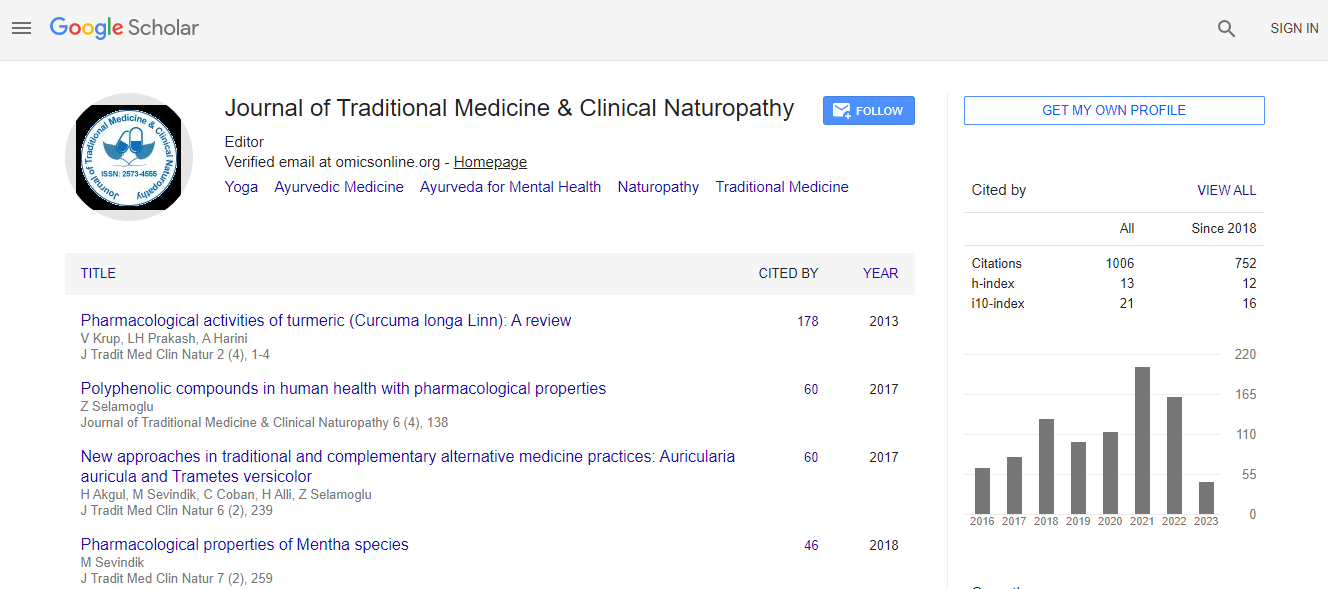Our Group organises 3000+ Global Events every year across USA, Europe & Asia with support from 1000 more scientific Societies and Publishes 700+ ║┌┴Ž═° Journals which contains over 50000 eminent personalities, reputed scientists as editorial board members.
║┌┴Ž═° Journals gaining more Readers and Citations
700 Journals and 15,000,000 Readers Each Journal is getting 25,000+ Readers
Citations : 1504
Indexed In
- CAS Source Index (CASSI)
- Google Scholar
- Sherpa Romeo
- Open J Gate
- Genamics JournalSeek
- RefSeek
- Directory of Research Journal Indexing (DRJI)
- Hamdard University
- EBSCO A-Z
- Publons
- Geneva Foundation for Medical Education and Research
- Euro Pub
- ICMJE
Useful Links
Recommended Journals
Related Subjects
Share This Page
Simulation training with abdominal simulators in traditional Japanese (Kampo) medicine
6th International Conference and Exhibition on Traditional & Alternative Medicine
Natsumi Saito1, Shin Takayama1, Takehiro Numata1, Ryutaro Arita1, Soichiro Kaneko, Tetsuharu Kamiya, Hidekazu Watanabe, Hitoshi Nishikawa, Yuka Ikeno, Minoru Ohsawa, Akiko Kikuchi, Junichi Tanaka, Hitoshi Kuroda, Michiaki Abe1, Kazuyoshi Yamashita and Tadashi Ishii
Tohoku University Hospital, Japan Japanese Red-cross Sendai Hospital, Japan
ScientificTracks Abstracts: J Tradi Med Clin Natur
DOI:
Abstract
In 2001, traditional Japanese (Kampo) medicine was included in the Japanese medical schools├ó┬?┬? model core curriculum. The original concepts of Kampo medicine for the treatment of various diseases involve the use of history taking and unique physical examinations including abdominal diagnosis. Recently, simulators of abdominal diagnosis (hereafter referred to as ├ó┬?┬?abdominal simulators├ó┬?┬Ø) were developed and have been incorporated in Kampo medicine training. This study aimed to assess the influence of hands-on training with lectures using abdominal simulators on Kampo medicine education in medical students. Fifty-one medical students (grade; 1st to 6th; mean age, 23.1 years; male: 33; female: 18) underwent training. First, they palpated 7 types of abdominal simulators and answered a test after receiving basic lectures on abdominal diagnosis. Then, they palpated same simulators and answered the test again after receiving detailed lectures on abdominal diagnosis. The correct answer rates in the tests taken after basic and detailed lectures were compared. The total correct answer rates for abdominal signs with the simulators significantly increased after the detailed lecture (78.2% vs. 94.4%, p<0.001). The total correct answer rates for formulae related to the abdominal signs also increased after the detailed lecture (21.8% vs. 59.7%, p<0.001). Lectures with abdominal simulator training can promote students├ó┬?┬? understanding of Kampo medicine. Lectures using abdominal simulators can promote students├ó┬?┬? understanding of abdominal diagnosis. Kampo formulae are selected on the basis of physical examinations; therefore, simulation training will be useful in education of medical students.Biography
Natsumi Saito graduated from Yokohama City University, School of Medicine in 2009. She is a Board Certified Member of the Japanese Society of Internal Medicine. She has completed her Doctor Course at Graduate School of Tohoku University, Department of Education and Support for Regional Medicine, Department of Kampo Medicine. She is the Resident Doctor of General Medicine and of Kampo Medicine in Japanese Red-Cross Sendai Hospital.

